Sangwon Ryu
GuRE:Generative Query REwriter for Legal Passage Retrieval
May 19, 2025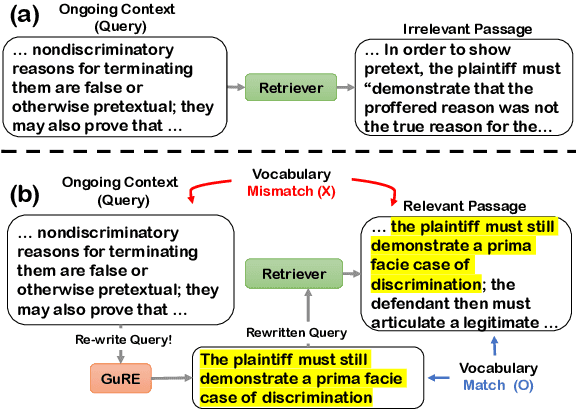
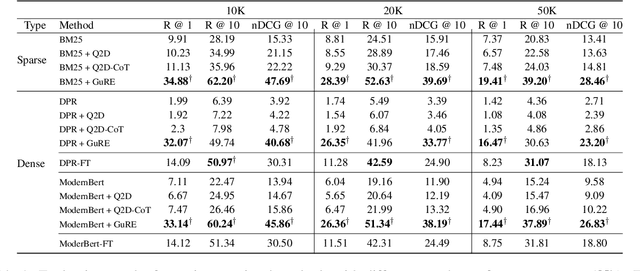
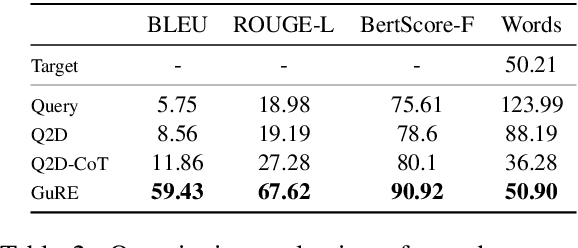
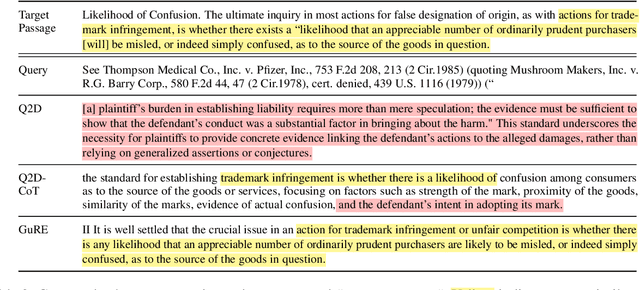
Abstract:Legal Passage Retrieval (LPR) systems are crucial as they help practitioners save time when drafting legal arguments. However, it remains an underexplored avenue. One primary reason is the significant vocabulary mismatch between the query and the target passage. To address this, we propose a simple yet effective method, the Generative query REwriter (GuRE). We leverage the generative capabilities of Large Language Models (LLMs) by training the LLM for query rewriting. "Rewritten queries" help retrievers to retrieve target passages by mitigating vocabulary mismatch. Experimental results show that GuRE significantly improves performance in a retriever-agnostic manner, outperforming all baseline methods. Further analysis reveals that different training objectives lead to distinct retrieval behaviors, making GuRE more suitable than direct retriever fine-tuning for real-world applications. Codes are avaiable at github.com/daehuikim/GuRE.
Revisiting Early Detection of Sexual Predators via Turn-level Optimization
Mar 09, 2025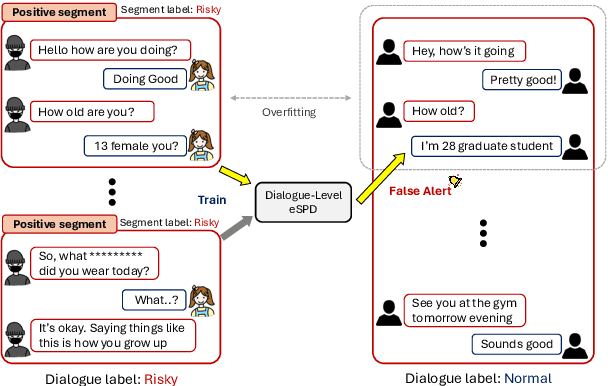



Abstract:Online grooming is a severe social threat where sexual predators gradually entrap child victims with subtle and gradual manipulation. Therefore, timely intervention for online grooming is critical for proactive protection. However, previous methods fail to determine the optimal intervention points (i.e., jump to conclusions) as they rely on chat-level risk labels by causing weak supervision of risky utterances. For timely detection, we propose speed control reinforcement learning (SCoRL) (The code and supplementary materials are available at https://github.com/jinmyeongAN/SCoRL), incorporating a practical strategy derived from luring communication theory (LCT). To capture the predator's turn-level entrapment, we use a turn-level risk label based on the LCT. Then, we design a novel speed control reward function that balances the trade-off between speed and accuracy based on turn-level risk label; thus, SCoRL can identify the optimal intervention moment. In addition, we introduce a turn-level metric for precise evaluation, identifying limitations in previously used chat-level metrics. Experimental results show that SCoRL effectively preempted online grooming, offering a more proactive and timely solution. Further analysis reveals that our method enhances performance while intuitively identifying optimal early intervention points.
Teach-to-Reason with Scoring: Self-Explainable Rationale-Driven Multi-Trait Essay Scoring
Feb 28, 2025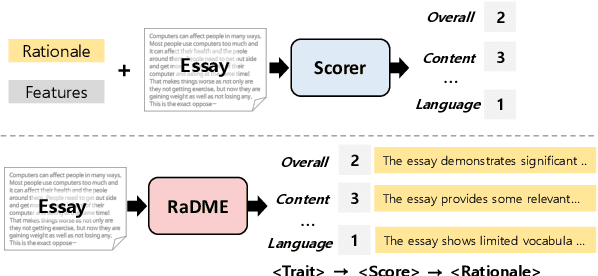



Abstract:Multi-trait automated essay scoring (AES) systems provide a fine-grained evaluation of an essay's diverse aspects. While they excel in scoring, prior systems fail to explain why specific trait scores are assigned. This lack of transparency leaves instructors and learners unconvinced of the AES outputs, hindering their practical use. To address this, we propose a self-explainable Rationale-Driven Multi-trait automated Essay scoring (RaDME) framework. RaDME leverages the reasoning capabilities of large language models (LLMs) by distilling them into a smaller yet effective scorer. This more manageable student model is optimized to sequentially generate a trait score followed by the corresponding rationale, thereby inherently learning to select a more justifiable score by considering the subsequent rationale during training. Our findings indicate that while LLMs underperform in direct AES tasks, they excel in rationale generation when provided with precise numerical scores. Thus, RaDME integrates the superior reasoning capacities of LLMs into the robust scoring accuracy of an optimized smaller model. Extensive experiments demonstrate that RaDME achieves both accurate and adequate reasoning while supporting high-quality multi-trait scoring, significantly enhancing the transparency of AES.
Towards Prompt Generalization: Grammar-aware Cross-Prompt Automated Essay Scoring
Feb 12, 2025



Abstract:In automated essay scoring (AES), recent efforts have shifted toward cross-prompt settings that score essays on unseen prompts for practical applicability. However, prior methods trained with essay-score pairs of specific prompts pose challenges in obtaining prompt-generalized essay representation. In this work, we propose a grammar-aware cross-prompt trait scoring (GAPS), which internally captures prompt-independent syntactic aspects to learn generic essay representation. We acquire grammatical error-corrected information in essays via the grammar error correction technique and design the AES model to seamlessly integrate such information. By internally referring to both the corrected and the original essays, the model can focus on generic features during training. Empirical experiments validate our method's generalizability, showing remarkable improvements in prompt-independent and grammar-related traits. Furthermore, GAPS achieves notable QWK gains in the most challenging cross-prompt scenario, highlighting its strength in evaluating unseen prompts.
Multi-Facet Blending for Faceted Query-by-Example Retrieval
Dec 02, 2024Abstract:With the growing demand to fit fine-grained user intents, faceted query-by-example (QBE), which retrieves similar documents conditioned on specific facets, has gained recent attention. However, prior approaches mainly depend on document-level comparisons using basic indicators like citations due to the lack of facet-level relevance datasets; yet, this limits their use to citation-based domains and fails to capture the intricacies of facet constraints. In this paper, we propose a multi-facet blending (FaBle) augmentation method, which exploits modularity by decomposing and recomposing to explicitly synthesize facet-specific training sets. We automatically decompose documents into facet units and generate (ir)relevant pairs by leveraging LLMs' intrinsic distinguishing capabilities; then, dynamically recomposing the units leads to facet-wise relevance-informed document pairs. Our modularization eliminates the need for pre-defined facet knowledge or labels. Further, to prove the FaBle's efficacy in a new domain beyond citation-based scientific paper retrieval, we release a benchmark dataset for educational exam item QBE. FaBle augmentation on 1K documents remarkably assists training in obtaining facet conditional embeddings.
Guide-to-Explain for Controllable Summarization
Nov 19, 2024



Abstract:Recently, large language models (LLMs) have demonstrated remarkable performance in abstractive summarization tasks. However, controllable summarization with LLMs remains underexplored, limiting their ability to generate summaries that align with specific user preferences. In this paper, we first investigate the capability of LLMs to control diverse attributes, revealing that they encounter greater challenges with numerical attributes, such as length and extractiveness, compared to linguistic attributes. To address this challenge, we propose a guide-to-explain framework (GTE) for controllable summarization. Our GTE framework enables the model to identify misaligned attributes in the initial draft and guides it in explaining errors in the previous output. Based on this reflection, the model generates a well-adjusted summary. As a result, by allowing the model to reflect on its misalignment, we generate summaries that satisfy the desired attributes in surprisingly fewer iterations than other iterative methods solely using LLMs.
Autoregressive Multi-trait Essay Scoring via Reinforcement Learning with Scoring-aware Multiple Rewards
Sep 26, 2024Abstract:Recent advances in automated essay scoring (AES) have shifted towards evaluating multiple traits to provide enriched feedback. Like typical AES systems, multi-trait AES employs the quadratic weighted kappa (QWK) to measure agreement with human raters, aligning closely with the rating schema; however, its non-differentiable nature prevents its direct use in neural network training. In this paper, we propose Scoring-aware Multi-reward Reinforcement Learning (SaMRL), which integrates actual evaluation schemes into the training process by designing QWK-based rewards with a mean-squared error penalty for multi-trait AES. Existing reinforcement learning (RL) applications in AES are limited to classification models despite associated performance degradation, as RL requires probability distributions; instead, we adopt an autoregressive score generation framework to leverage token generation probabilities for robust multi-trait score predictions. Empirical analyses demonstrate that SaMRL facilitates model training, notably enhancing scoring of previously inferior prompts.
Ontology-Free General-Domain Knowledge Graph-to-Text Generation Dataset Synthesis using Large Language Model
Sep 11, 2024



Abstract:Knowledge Graph-to-Text (G2T) generation involves verbalizing structured knowledge graphs into natural language text. Recent advancements in Pretrained Language Models (PLMs) have improved G2T performance, but their effectiveness depends on datasets with precise graph-text alignment. However, the scarcity of high-quality, general-domain G2T generation datasets restricts progress in the general-domain G2T generation research. To address this issue, we introduce Wikipedia Ontology-Free Graph-text dataset (WikiOFGraph), a new large-scale G2T dataset generated using a novel method that leverages Large Language Model (LLM) and Data-QuestEval. Our new dataset, which contains 5.85M general-domain graph-text pairs, offers high graph-text consistency without relying on external ontologies. Experimental results demonstrate that PLM fine-tuned on WikiOFGraph outperforms those trained on other datasets across various evaluation metrics. Our method proves to be a scalable and effective solution for generating high-quality G2T data, significantly advancing the field of G2T generation.
Key-Element-Informed sLLM Tuning for Document Summarization
Jun 07, 2024Abstract:Remarkable advances in large language models (LLMs) have enabled high-quality text summarization. However, this capability is currently accessible only through LLMs of substantial size or proprietary LLMs with usage fees. In response, smaller-scale LLMs (sLLMs) of easy accessibility and low costs have been extensively studied, yet they often suffer from missing key information and entities, i.e., low relevance, in particular, when input documents are long. We hence propose a key-element-informed instruction tuning for summarization, so-called KEITSum, which identifies key elements in documents and instructs sLLM to generate summaries capturing these key elements. Experimental results on dialogue and news datasets demonstrate that sLLM with KEITSum indeed provides high-quality summarization with higher relevance and less hallucinations, competitive to proprietary LLM.
Multi-Dimensional Optimization for Text Summarization via Reinforcement Learning
Jun 01, 2024



Abstract:The evaluation of summary quality encompasses diverse dimensions such as consistency, coherence, relevance, and fluency. However, existing summarization methods often target a specific dimension, facing challenges in generating well-balanced summaries across multiple dimensions. In this paper, we propose multi-objective reinforcement learning tailored to generate balanced summaries across all four dimensions. We introduce two multi-dimensional optimization (MDO) strategies for adaptive learning: 1) MDO_min, rewarding the current lowest dimension score, and 2) MDO_pro, optimizing multiple dimensions similar to multi-task learning, resolves conflicting gradients across dimensions through gradient projection. Unlike prior ROUGE-based rewards relying on reference summaries, we use a QA-based reward model that aligns with human preferences. Further, we discover the capability to regulate the length of summaries by adjusting the discount factor, seeking the generation of concise yet informative summaries that encapsulate crucial points. Our approach achieved substantial performance gains compared to baseline models on representative summarization datasets, particularly in the overlooked dimensions.
 Add to Chrome
Add to Chrome Add to Firefox
Add to Firefox Add to Edge
Add to Edge